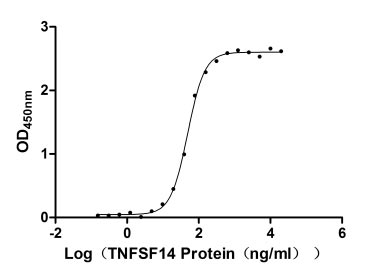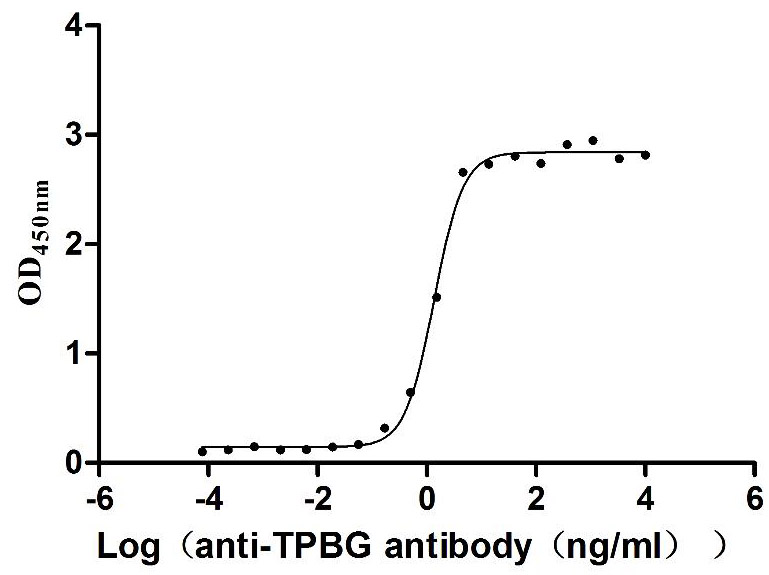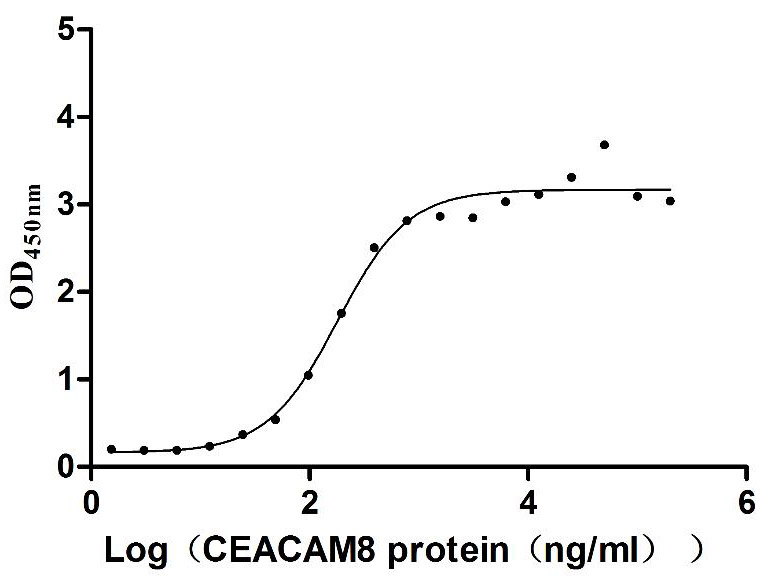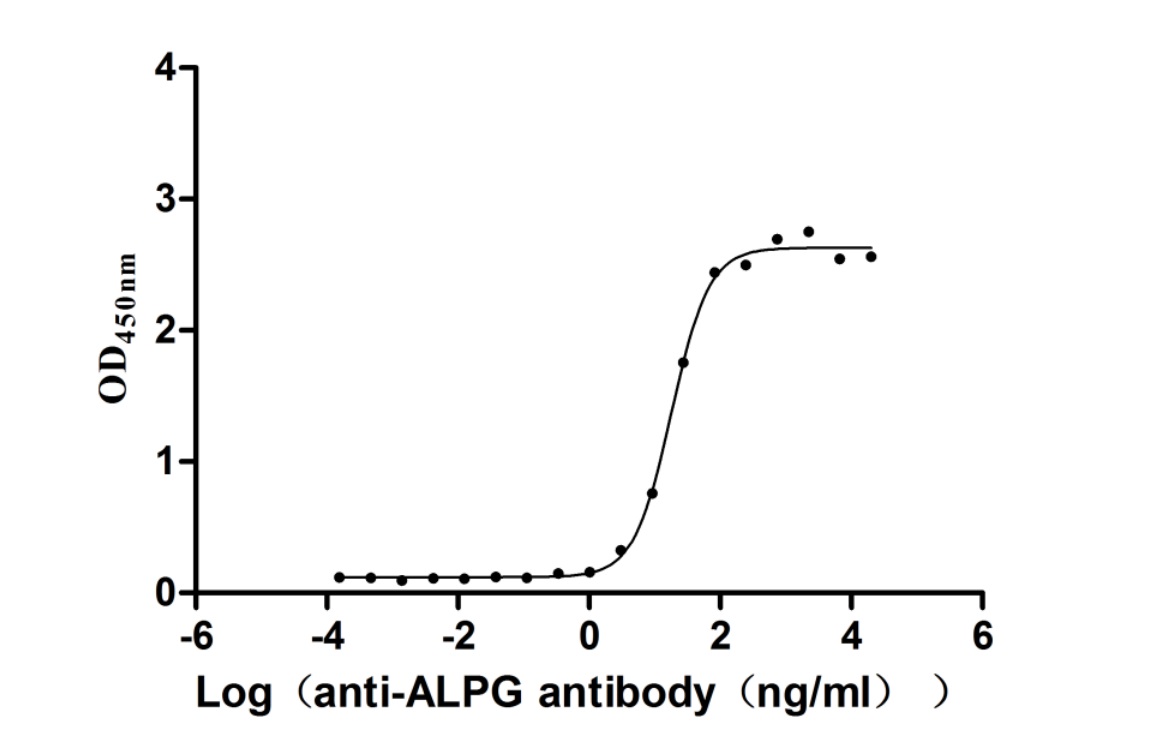Recombinant Mouse Homeobox protein Nkx-3.1 (Nkx3-1)
-
中文名称:小鼠Nkx3-1重组蛋白
-
货号:CSB-YP015848MO
-
规格:
-
来源:Yeast
-
其他:
-
中文名称:小鼠Nkx3-1重组蛋白
-
货号:CSB-EP015848MO
-
规格:
-
来源:E.coli
-
其他:
-
中文名称:小鼠Nkx3-1重组蛋白
-
货号:CSB-EP015848MO-B
-
规格:
-
来源:E.coli
-
共轭:Avi-tag Biotinylated
E. coli biotin ligase (BirA) is highly specific in covalently attaching biotin to the 15 amino acid AviTag peptide. This recombinant protein was biotinylated in vivo by AviTag-BirA technology, which method is BriA catalyzes amide linkage between the biotin and the specific lysine of the AviTag.
-
其他:
-
中文名称:小鼠Nkx3-1重组蛋白
-
货号:CSB-BP015848MO
-
规格:
-
来源:Baculovirus
-
其他:
-
中文名称:小鼠Nkx3-1重组蛋白
-
货号:CSB-MP015848MO
-
规格:
-
来源:Mammalian cell
-
其他:
产品详情
-
纯度:>85% (SDS-PAGE)
-
基因名:Nkx3-1
-
Uniprot No.:
-
别名:Nkx3-1; Nkx-3.1; Nkx3a; Homeobox protein Nkx-3.1; Homeobox protein NK-3 homolog A
-
种属:Mus musculus (Mouse)
-
蛋白长度:Full length protein
-
表达区域:1-237
-
氨基酸序列MLRVAEPREP RVEAGGRSPW AAPPTQSKRL TSFLIQDILR DRAERHGGHS GNPQHSPDPR RDSAPEPDKA GGRGVAPEDP PSIRHSPAET PTEPESDAHF ETYLLDCEHN PGDLASAPQV TKQPQKRSRA AFSHTQVIEL ERKFSHQKYL SAPERAHLAK NLKLTETQVK IWFQNRRYKT KRKQLSEDLG VLEKNSPLSL PALKDDSLPS TSLVSVYTSY PYYPYLYCLG SWHPSFW
-
蛋白标签:Tag type will be determined during the manufacturing process.
The tag type will be determined during production process. If you have specified tag type, please tell us and we will develop the specified tag preferentially. -
产品提供形式:Lyophilized powder
Note: We will preferentially ship the format that we have in stock, however, if you have any special requirement for the format, please remark your requirement when placing the order, we will prepare according to your demand. -
复溶:We recommend that this vial be briefly centrifuged prior to opening to bring the contents to the bottom. Please reconstitute protein in deionized sterile water to a concentration of 0.1-1.0 mg/mL.We recommend to add 5-50% of glycerol (final concentration) and aliquot for long-term storage at -20℃/-80℃. Our default final concentration of glycerol is 50%. Customers could use it as reference.
-
储存条件:Store at -20°C/-80°C upon receipt, aliquoting is necessary for mutiple use. Avoid repeated freeze-thaw cycles.
-
保质期:The shelf life is related to many factors, storage state, buffer ingredients, storage temperature and the stability of the protein itself.
Generally, the shelf life of liquid form is 6 months at -20°C/-80°C. The shelf life of lyophilized form is 12 months at -20°C/-80°C. -
货期:Delivery time may differ from different purchasing way or location, please kindly consult your local distributors for specific delivery time.Note: All of our proteins are default shipped with normal blue ice packs, if you request to ship with dry ice, please communicate with us in advance and extra fees will be charged.
-
注意事项:Repeated freezing and thawing is not recommended. Store working aliquots at 4°C for up to one week.
-
Datasheet :Please contact us to get it.
靶点详情
-
功能:Transcription factor, which binds preferentially the consensus sequence 5'-TAAGT[AG]-3' and can behave as a transcriptional repressor. Plays an important role in normal prostate development, regulating proliferation of glandular epithelium and in the formation of ducts in prostate. Acts as a tumor suppressor controlling prostate carcinogenesis, as shown by the ability to suppress growth and tumorigenicity of prostate carcinoma cells. Plays a role in the formation of minor salivary glands (particularly palatine and lingual glands).
-
基因功能参考文献:
- Prostate cancer patients with low NKX3.1 expression are optimal candidates for intervention with 5alpha-reductase inhibitors as an adjunct to active surveillance. PMID: 28385453
- During prostate cancer initiation, Nkx3.1 expression is frequently lost in both humans and mouse models. Data, including data from studies using cells from transgenic mice, suggest that androgens activate Nkx3.1 transcription via androgen receptor binding to 11-kb region in both normal luminal cells and castration-resistant prostatic neoplasm cells via androgen response elements in Nkx3.1 3prime untranslated region. PMID: 28679531
- study demonstrated that expression of homeobox protein NK-3 homolog A(Nkx3.1) influenced both the timing and magnitude of the DNA damage response in the mouse prostate PMID: 26660523
- Nkx3.1 loss and Tmprss2-ERG upregulation do not cooperate to enhance prostate tumorigenesis in vivo. PMID: 25780911
- Id4 regulates NKX3.1, Sox9 and PTEN. PMID: 23786676
- activated canonical Wnt signals and Nkx3.1 function in a positive feedback loop to regulate prostate bud growth and luminal epithelial differentiation. PMID: 23813564
- multiple NKX3.1 binding sites were found in the RAMP1 locus in human prostate cancer cells and in the normal mouse prostate. PMID: 23867798
- Deletions of Klf5 and Nkx3-1 do not have a additive effect in prostatic carcinogenesis in mouse model. PMID: 23790631
- Transcriptional activation of prostate specific homeobox gene NKX3-1 in subsets of T-cell lymphoblastic leukemia (T-ALL). PMID: 22848398
- Androgen-dependent transcription of the mouse Nkx3.1 gene is conferred through a noncanonical element within the intron of the gene. PMID: 21526719
- Nkx3.1 has a role in bacterial prostatitis and its progression to inflammation and neoplasia PMID: 20363913
- Data show in Pten and Nkx3.1 mutant mice, cells with increased levels of SOX9 appeared within prostate epithelia at early stages of neoplasia, and higher expression correlated with progression at all stages of disease. PMID: 20103652
- loss of function of Nkx3.1 and Pten cooperate in prostate carcinogeneis in mice. PMID: 11854455
- Nkx3.1 mutant mice recapitulate early stages of prostate carcinogenesis. PMID: 12036903
- Nkx3.1 contributes to the formation of the axial skeleton PMID: 12204261
- Nkx3.1(+/-); Pten(+/-) mice recapitulate key features of advanced prostate cancer and represent a useful model for investigating associated molecular mechanisms and for evaluating therapeutic approaches. PMID: 12873978
- Nkx3.1 homeobox gene has roles in prostate organogenesis and carcinogenesis (review) PMID: 14648854
- Nkx3.1 and p27kip1 regulate prostatic epithelial cell proliferation and tumor initiation by affecting both haploinsufficient and nonhaploinsufficient pathways PMID: 15111307
- Findings provide a molecular link between a gene whose inactivation is known to be involved in prostate carcinogenesis, namely Nkx3.1, and oxidative damage of the prostatic epithelium. PMID: 16061659
- Nkx3.1 negatively regulates Sp-mediated transcription via the tethering of histone deacetylases and/or by inhibiting the association of Sp proteins with co-activators. PMID: 16201967
- Distinct regulatory elements mediate the dynamic expression pattern of Nkx3.1. PMID: 16245334
- NKX3-1 ia regulated by protein kinase CK2 in prostate tumor cells. PMID: 16581776
- PTEN loss causes reduced NKX3.1 expression in both murine and human prostate cancers. PMID: 16697957
- Nkx3.1mutant mice develop prostatic intraepithelial neoplasia and adenocarcinoma as a consequence of aging, as well as following castration. PMID: 16912166
- By manipulating serum levels of testosterone for an extended period, it was found that prolonged exposure of Nkx3.1; Pten mutant mice to androgen levels that are 10-fold lower than normal resulted in a marked acceleration of prostate tumorigenesis. PMID: 17909013
- NKX3.1 can be ubiquitinated by TOPORS in vitro and in vivo, and overexpression of TOPORS leads to NKX3.1 proteasomal degradation in prostate cancer cells PMID: 18077445
- Fem1b may have a conserved role in the generation of sexual dimorphism through its interaction with Nkx3.1 in the developing prostate gland PMID: 18816836
- Molecular consequences of NKX3.1 loss depend on the epithelial proliferative stage at which its expression is lost, and that alterations in the PTEN-AKT-NKX3.1 axis are important for prostate cancer initiation. PMID: 19597465
- MYOCD can discriminate among several juxtaposed CArG elements, presumably through its novel partnership with NKX3.1, to optimally transactivate the human ACTG2 promoter PMID: 19797053
显示更多
收起更多
-
亚细胞定位:Nucleus.
-
蛋白家族:NK-3 homeobox family
-
组织特异性:Expressed mostly in the male urogenital tract, with highest expression in the epithelial cells lining the ducts of anterior, dorsolateral and ventral prostate and in the bulbourethral gland, and much lower in the seminal vesicle and the testis. Expression
-
数据库链接:
KEGG: mmu:18095
STRING: 10090.ENSMUSP00000022646
UniGene: Mm.3520
Most popular with customers
-
Recombinant Human Tumor necrosis factor ligand superfamily member 14 (TNFSF14), partial (Active)
Express system: Mammalian cell
Species: Homo sapiens (Human)
-
Recombinant Human Glypican-3 (GPC3) (G537R), partial (Active)
Express system: Mammalian cell
Species: Homo sapiens (Human)
-
Recombinant Human Leukemia inhibitory factor receptor (LIFR), partial (Active)
Express system: Mammalian cell
Species: Homo sapiens (Human)
-
Recombinant Human Trophoblast glycoprotein (TPBG), partial (Active)
Express system: Mammalian cell
Species: Homo sapiens (Human)
-
Recombinant Human Carcinoembryonic antigen-related cell adhesion molecule 6 (CEACAM6) (Active)
Express system: Mammalian cell
Species: Homo sapiens (Human)
-
Recombinant Human Alkaline phosphatase, germ cell type (ALPG) (Active)
Express system: Mammalian cell
Species: Homo sapiens (Human)
-
Recombinant Human CUB domain-containing protein 1 (CDCP1), partial (Active)
Express system: Mammalian cell
Species: Homo sapiens (Human)
-
Recombinant Mouse Cytotoxic and regulatory T-cell molecule (Crtam), partial (Active)
Express system: Mammalian cell
Species: Mus musculus (Mouse)



-AC1.jpg)
















